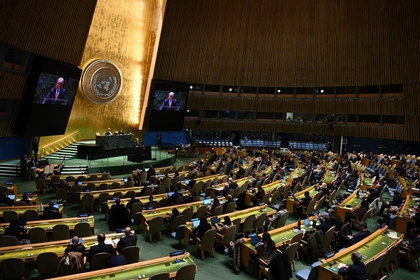The Russian news site Kommersant covered the presentation, given to Russia’s State Duma and Federation Council on Wednesday, of the final report of the parliamentary commission set up in 2022 to “investigate criminal acts against minors by the Kyiv regime.”
Accusations that Ukraine was illegally harvesting organs, firstly from wounded serviceman and then from abducted children, have long been promoted by pro-Kremlin propagandists.
JOIN US ON TELEGRAM
Follow our coverage of the war on the @Kyivpost_official.
The claims have been made in the total absence of any “evidence” and have consistently been proven to be false by fact checkers throughout Europe, such as #disinfo chronicle.
On Wednesday, June 19, Anna Kuznetsova, co-chair of the commission presented a 182-page report that addresses Kyiv’s so-called crimes against children under ten chapter headings that cover: murders, abductions, crimes against sexual integrity, recruitment, use of child soldiers and drug trafficking, among others. A summary of her comments can be seen here.
The report comes in the wake of a Financial Times investigative report published on June 12 that details Russia’s abduction of at least four Ukrainian children.
Already in March 2023 the International Criminal Court (ICC) had issued an arrest warrant for Russian President Vladimir Putin on the war crime accusation of unlawfully deporting Ukrainian children, and for Maria Lvova-Belova, Russia’s presidential commissioner for children’s rights, on similar charges.

US Urges Backing of ‘Simple’ UN Resolution as Trump Calls for Putin-Zelensky Talks
An established methodological pattern
Since the burden of proof is on the accuser and it is logically impossible to disprove accusations that offer no concrete evidence and have no factual basis, it must be sufficient to highlight a methodological pattern in Russia’s disinformation campaign.
Throughout the past, Russia has quite simply mirrored proven accusations against it. Sometimes it is just a vague form of “what-about-ism”; whereas in this case, a formal report has effectively imitated the ICC charges and “upped the ante.”
What is clear, however, is the fact that the Russian Duma’s accusations echo the narratives of Moscow-orchestrated disinformation campaigns on social media.
For example, in October 2023, the Center for Strategic Communications, based in Kyiv, addressed the “Ukrainian child abuse” disinformation campaign by debunking a specific social media post.
A slew of established Russian propaganda accounts claimed that Save the Children in Ukraine had published tips on how to protect a child from being abducted for organ harvesting, as graves of babies without internal organs had allegedly been found near a hospital in Kharkiv. They also added manipulative photos that allegedly confirmed the crime.
The international organization Save the Children in Ukraine denied any involvement in this “advertising campaign.”
“If you see an advertisement on Facebook allegedly on behalf of our organization that causes you concern, please let us know. We will do our best to block all potentially harmful messages,” the organization wrote.
Ukraine’s independent Espreso news site reported that the account spreading this disinformation had blocked Save the Children’s official page.
Conclusion
The paucity of evidence offered by Russians accusers – long disproven charges based clearly on orchestrated disinformation – combined with established evidence against Russia, leads to the conclusion that there is a systematic attempt to dilute international outrage at the behavior of Russian authorities in their ongoing attack on Ukraine.
You can also highlight the text and press Ctrl + Enter











